人教版八年级英语下册unit3第二课时导学案
八年级英语下册 Unit 3 Could you please clean your room导学案(新版)人教新目标版
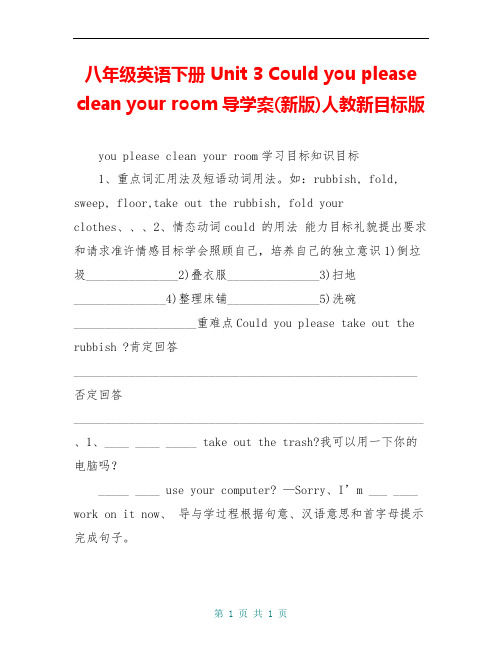
八年级英语下册 Unit 3 Could you please clean your room导学案(新版)人教新目标版you please clean your room学习目标知识目标1、重点词汇用法及短语动词用法。
如:rubbish, fold, sweep, floor,take out the rubbish, fold your clothes、、、2、情态动词could 的用法能力目标礼貌提出要求和请求准许情感目标学会照顾自己,培养自己的独立意识1)倒垃圾_______________2)叠衣服_______________3)扫地_______________4)整理床铺_______________5)洗碗____________________重难点Could you please take out the rubbish ?肯定回答________________________________________________________否定回答_________________________________________________________、1、____ ____ _____ take out the trash?我可以用一下你的电脑吗?_____ ____ use your computer? —Sorry、I’m ___ ____ work on it now、导与学过程根据句意、汉语意思和首字母提示完成句子。
1、The children are picking up the r_________(垃圾)in the river、2、 Children often help s__________(打扫)the rooms in the old p eople’s home、3、 There are some dirty clothes on the f_________(地板)in his bedroom、4、Tom’s room is really in a m________(不整洁)、5、-Mary, could you help f_________(折叠)the clothes?-Yes, sure、课后反思本课所得:本课不足:课后作业句型转换1、He has to clean his room himself、(疑问)____ he ____ ___ clean his room himself?2、Youd better take out the trash、(否定)Youdbetter ____ ____ out the trash、3、Its a very boring thing、(感叹句) _____ ____ ____ ____ it is!4、She cleans her room twice a week、(提问)________ ____ she ____ her room?5、They took some photos there、(否定) They ________ ___ photos there、6、Paul and Tom werent at school yesterday、(提问)___ ___ at school yesterday?7、A、 She was late yesterday because she was ill、B、 She was late yesterday ________ ________ herillness(病)、8、My mum asked me not to play computer、My mum asked me to ______ ____ computer、9、Can you come to my party on Monday at19:00?(同义)___ ___ ___ ____ cometo my party on Monday at19:00?10、Lets go fishing on Sunday、(同义)____ ____fishing on Sunday?第2课时Section A2a--2d学习目标知识目标1、重点词汇用法及短语动词用法。
八年级英语下册(人教版).docUnit3第二课时教学设计
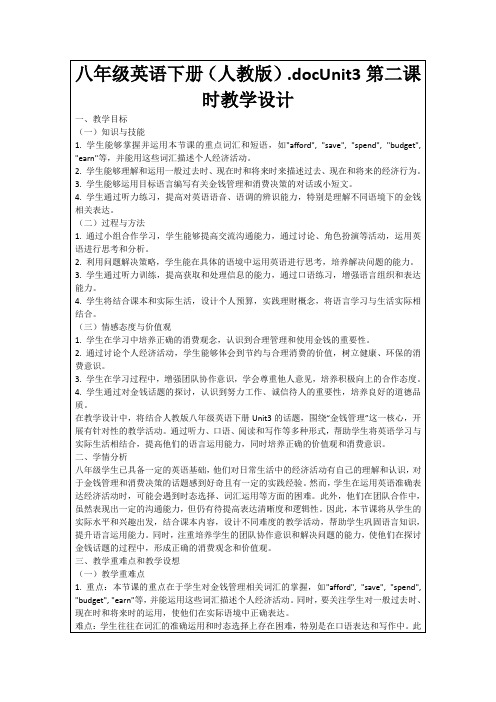
4.学生将结合课本和实际生活,设计人预算,实践理财概念,将语言学习与生活实际相结合。
(三)情感态度与价值观
1.学生在学习中培养正确的消费观念,认识到合理管理和使用金钱的重要性。
2.通过讨论个人经济活动,学生能够体会到节约与合理消费的价值,树立健康、环保的消费意识。
3.学生在学习过程中,增强团队协作意识,学会尊重他人意见,培养积极向上的合作态度。
4.学生通过对金钱话题的探讨,认识到努力工作、诚信待人的重要性,培养良好的道德品质。
在教学设计中,将结合人教版八年级英语下册Unit3的话题,围绕“金钱管理”这一核心,开展有针对性的教学活动。通过听力、口语、阅读和写作等多种形式,帮助学生将英语学习与实际生活相结合,提高他们的语言运用能力,同时培养正确的价值观和消费意识。
2.口语作业:
学生以小组为单位,录制一段关于金钱管理的对话,话题可以包括购物、旅游、预算制定等。要求对话中包含本节课的重点词汇和时态,每个小组成员都要有发言。此作业旨在提高学生的口语表达能力,同时加强团队合作。
3.听力作业:
学生需要在家中观看一段与金钱管理相关的英语视频或听力材料,并完成相应的听力练习。这些练习旨在帮助学生提高听力理解能力,特别是在捕捉关键信息和处理复杂句子结构方面。
二、学情分析
八年级学生已具备一定的英语基础,他们对日常生活中的经济活动有自己的理解和认识,对于金钱管理和消费决策的话题感到好奇且有一定的实践经验。然而,学生在运用英语准确表达经济活动时,可能会遇到时态选择、词汇运用等方面的困难。此外,他们在团队合作中,虽然表现出一定的沟通能力,但仍有待提高表达清晰度和逻辑性。因此,本节课将从学生的实际水平和兴趣出发,结合课本内容,设计不同难度的教学活动,帮助学生巩固语言知识,提升语言运用能力。同时,注重培养学生的团队协作意识和解决问题的能力,使他们在探讨金钱话题的过程中,形成正确的消费观念和价值观。
人教版英语八年级下册导学案

Unit4Section A一、学习目标:1) Important words: mad, anymore, message, suppose, hard-working2) Important phrases: watch soap operas, be supposed to do, first of all, pass on, sth. happen on …3) Important Sentences①She said she was mad at Marcia. ②She said she was having a party for Lana.③What happened on “Young Lives” last night? ④You are supposed to meet at the bus stop to return it.4) Grammar: 直接引语和间接引语二、学法指导:运用任务型学习,驱动学生掌握直接引语与间接引语之间的转化三、学习过程:Step1自学单元语法:(直接引语和间接引语)(一) 直接引语和间接引语的含义:引述别人的话时,一般采用两种形式:一是引用别人的原话,两边用引号标出,称为直接引语;二是用自己的语言转述别人的话,称为间接引语。
间接引语在句中实际上就是宾语从句。
(二) 直接引语变间接引语的方法:1.从句人称的变化:由直接引语变间接引语时,从句的主语人称要遵循一主、二宾、三不变的原则。
1)直接引语的主语是第一人称时,变为间接引语时要和主句的主语保持一致。
2)eg:①They said,“We will go there by bus”。
→They said they would go there by bus.3)②He said,“I am visiting my aunt next week.”→He said that he was visiting his aunt next week.2)如果直接引语的主语是第二人称,变为间接引语时要与主句的宾语保持一致。
2020年春人教新目标英语八年级下册Unit3 全单元导学案(答案不全)

2020年春人教新目标英语八年级下册Unit3 Could you please clean your room?Section A(1a-2d)一、写出下面的短语动词1) 出去吃饭_______________ 2)在外面待到很晚_______________3)去看电影_______________4)搭车_______________ 5)完成做某事_______________ 6)干净整洁_______________7)洗餐具_______________ 8)倒垃圾_______________9)叠衣服_______________ 10)扫地_______________二、根据汉语意思完成句子,每空一词。
Linda often helps her mother________ _______ ________(洗餐具)after dinner.Jack, remember to_______ _______ _______(整理床铺)after you get up.---Could I_______ ________ ________(搭便车)to the center of the city---Certainly, please get into the car.We can’t______ ______ _______(在外面待到很晚)on weekdays.---Lucy, have you finished_______ _______ ________ ________(打扫客厅)?---Sorry, I’ll d o it at once.三.选择填空。
()1.---Could you please turn off the light? ---__________.A. Yes, I couldB. No, I couldn’t.C. It doesn’t matter.D. Yes, sure.( ) 2 .-Could I look at your pictures? ---Yes, of course you_______.A. shouldB. couldC. willD. can( ) 3.---Could I use your computer, Jim?---Sorry, I’m going to ________now.A. work on itB. work it onC. work out itD. work it out( ) 4.---Mum, Could I finish________ the football match?---No, you have to do your homework first.A. watchB. to watchC. watchingD. to watching( ) 5.There are some books in the box. Could you please_________?A. take it outB. take them out C .take out it D. take out themSection A(3a-4c)一、预习3a-4c.完成下列翻译练习1、扔下_______________ 2.带某人去散步_______________3.整曰/夜_______________4.做家务_______________ 5.闲逛_______________ 6.把某物传给某人_____________________7.把某物借给某人_______________8.讨厌做某事_______________ 9.做杂务_______________ 10.帮助某人干某事_______________二、用所给词的适当形式填空。
英语人教版八年级下册Unit3
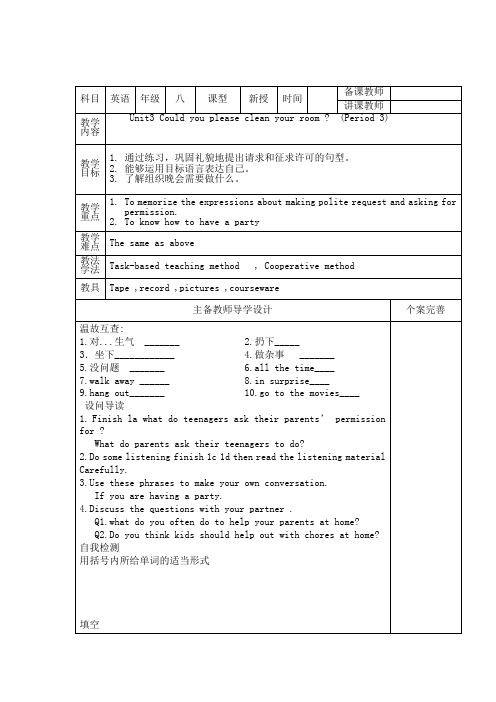
科目英语年级八课型新授时间备课教师讲课教师教学内容Unit3 Could you please clean your room ?(Period 3)教学目标1.通过练习,巩固礼貌地提出请求和征求许可的句型。
2.能够运用目标语言表达自己。
3.了解组织晚会需要做什么。
教学重点1.To memorize the expressions about making polite request and asking forpermission.2.To know how to have a party教学难点The same as above教法学法Task-based teaching method , Cooperative method教具Tape ,record ,pictures ,courseware主备教师导学设计个案完善温故互查:1.对...生气 _______2.扔下_____3.坐下____________ 4.做杂事 _______5.没问题 _______6.all the time____7.walk away ______ 8.in surprise____9.hang out_______ 10.go to the movies____设问导读1.Finish la what do teenagers ask their parents’ permissionfor ?What do parents ask their teenagers to do?2.Do some listening finish 1c 1d then read the listening material Carefully.e these phrases to make your own conversation.If you are having a party.4.Discuss the questions with your partner .Q1.what do you often do to help your parents at home?Q2.Do you think kids should help out with chores at home?自我检测用括号内所给单词的适当形式填空太谷实验中学导学案(二)主备教师导学设计个案完善1.Ann ,do the ______ (dish)before you go outside.2.Could you clean the ______(live)room?3.Thank you for ______(invite)me to your birthday party.4.Bob ______ (use)my CD player yesterday.Could you please buy some ______ (snack)?巩固练习将下列句子翻译成英语1.你能洗餐具吗? ____________2.请把垃圾拿出去,好吗? ____________3.我不得不打扫起居室。
英语课八年级导学案课题Unit3I’mmoreoutgoingthanmysister

幸福课堂英语课八年级导学案课题Unit 3 I 'm more outgoing than my sister. (第 3 课时) 学习目标:1) 复习巩固形容词的比较形式及对两者进行对比。
2) 进一步总结所学的对两者进行比较的句式结构。
3) 能运用所学的目标语言,进行说与写的活动,完成相关任务。
自研课:记忆单词词组,并背诵Grammar Focus(先天下午自研课30分钟)学习过程:一. 快乐链接:(预时5分钟)看视频学句型①Tina is taller tha n Tara.②Sam has Ion ger hair tha n Tom.③She also sings more loudly than Tara.二. 自主解读:(预时15分钟)自主学习Grammar Focus学习任务一:1.学生阅读Grammar Focus中的句子,然后做填空练习(1) 汤姆比萨姆更聪明吗?Is Tom Sam?(2) 不是。
萨姆比汤姆更聪明。
No, he isn ' t. Sam is T (3) 塔拉比蒂娜更外向吗?Is Tara Ti na (4) 不是。
蒂娜比塔拉更外向。
No, she isn T iiha isTara.(5) 你和你姐姐一样友善吗?you frie ndly your sister?(6) 不是。
我更友善一些。
学法学法一:学生们完成填空试题后,可以打开课本检查答案,对错误的句子,单独进行强化记忆。
学法二:两者进行比较,表示一方比另一方更……”的句型:1. A + be +形容词比较级+ than + B2. A +实义动词+副词比较级+than + B两者进行比较,表示一方与另一方om.一样……”的句型:1. A + be + as形容词原形+ as + B2. A +实义动词+ as副词原形+ as + B学法三:看所给的第一例句,让一名学生读例句,确定所有的学生都明白本题的做法。
八年级英语下册全册导学案
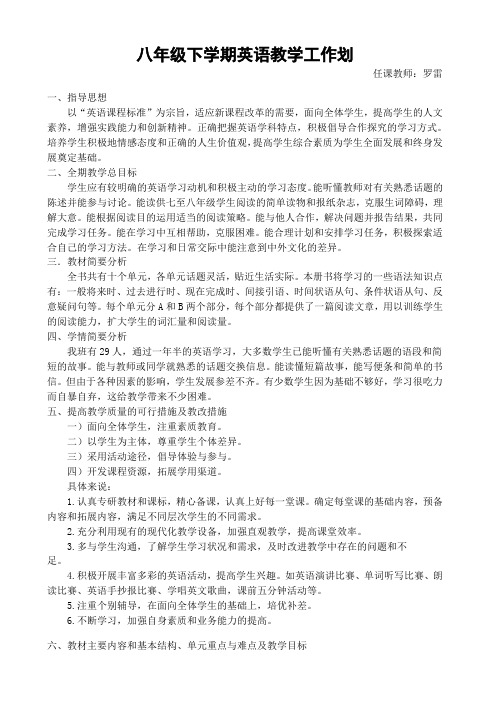
八年级下学期英语教学工作划任课教师:罗雷一、指导思想以“英语课程标准”为宗旨,适应新课程改革的需要,面向全体学生,提高学生的人文素养,增强实践能力和创新精神。
正确把握英语学科特点,积极倡导合作探究的学习方式。
培养学生积极地情感态度和正确的人生价值观,提高学生综合素质为学生全面发展和终身发展奠定基础。
二、全期教学总目标学生应有较明确的英语学习动机和积极主动的学习态度。
能听懂教师对有关熟悉话题的陈述并能参与讨论。
能读供七至八年级学生阅读的简单读物和报纸杂志,克服生词障碍,理解大意。
能根据阅读目的运用适当的阅读策略。
能与他人合作,解决问题并报告结果,共同完成学习任务。
能在学习中互相帮助,克服困难。
能合理计划和安排学习任务,积极探索适合自己的学习方法。
在学习和日常交际中能注意到中外文化的差异。
三.教材简要分析全书共有十个单元,各单元话题灵活,贴近生活实际。
本册书将学习的一些语法知识点有:一般将来时、过去进行时、现在完成时、间接引语、时间状语从句、条件状语从句、反意疑问句等。
每个单元分A和B两个部分,每个部分都提供了一篇阅读文章,用以训练学生的阅读能力,扩大学生的词汇量和阅读量。
四、学情简要分析我班有29人,通过一年半的英语学习,大多数学生已能听懂有关熟悉话题的语段和简短的故事。
能与教师或同学就熟悉的话题交换信息。
能读懂短篇故事,能写便条和简单的书信。
但由于各种因素的影响,学生发展参差不齐。
有少数学生因为基础不够好,学习很吃力而自暴自弃,这给教学带来不少困难。
五、提高教学质量的可行措施及教改措施一)面向全体学生,注重素质教育。
二)以学生为主体,尊重学生个体差异。
三)采用活动途径,倡导体验与参与。
四)开发课程资源,拓展学用渠道。
具体来说:1.认真专研教材和课标,精心备课,认真上好每一堂课。
确定每堂课的基础内容,预备内容和拓展内容,满足不同层次学生的不同需求。
2.充分利用现有的现代化教学设备,加强直观教学,提高课堂效率。
八年级英语下册_Unit_3_What_were_you_doing_when_the_UFO_arrived导学案

Unit 3 What were you doing when the UFO arrived?学案编写人:吕春苗Period One (Section A 1a-2c)【教师寄语】Nothing is difficult if you put your heart into it.世上无难事,只怕有心人。
【学习目标】:知识目标: 1.本课的13个单词以及相应的动词短语、介词短语。
(18-19页)2.重点句型:①A: What were you doing when the UFO arrived ?B: I was standing in front of the library when the UFO arrived.②A: What was the boy doing when the UFO landed?B: He was sleeping late.能力目标:熟练运用本课词汇及句型谈论在过去某一时间发生的事情。
情感目标:培养学生正确的价值观。
【学习重难点】:◆重点掌握过去进行时态的构成及用法。
◆难点掌握when和while的用法。
【预习指导】一.前置学习:1.仔细观察下面的对话,用“_____”标出对话中所出现的时间,并补全句子.(1)A: What are you doing now? B: I am doing my homework now. They are having an English lesson.(2)A: What were you doing at 9 o’clock last night? B: I was doing homework.C:_________________________________(我正在打扫我的房间).(3)A: What were you doing when your mother came back yesterday?B:I ______________________________________(我正在做作业).试着仿照前面的对话完成后面的句子并总结:对话1用了______进行时态,对话2用了__________进行时态.2.利用你的学习资料,自学过去进行时的构成及用法(练习册)3.仔细阅读课本1a—Grammar Focus的句子并翻译。
八年级英语下册导学案Unit3.2

surprise sb.指“让某人吃惊”I don’t want to surprise you .我不想让你吃惊。
6.kid小孩开玩笑
He is a kid . I passed the exam? you are kidding!
1. doing, were, what, you, arrived, UFO, the, when
2. library, standing, of, was, in, I, the, front
3. out, saw, she, get, alien, the
4. week, visited, Lucy, Flight, Museum, last, the
1. While I was in the kitchen, I heard someone ___________(shout) for help.
2. This English word has different ___________(mean) in Chinese.
3. Both of the old men are national ___________(hero).
2. Mary __________Shanghai yesterday.
3. They _________ in Hongkang the day before yesterday.
4. Tom____________ at school gate at 3:00 last Sunday.
连词成句
难
点
1.过去进行时与过去式在文章中的运用及二者的区别。
人教版英语八年级下册Unit3 SectionA(1a-2d)导学案
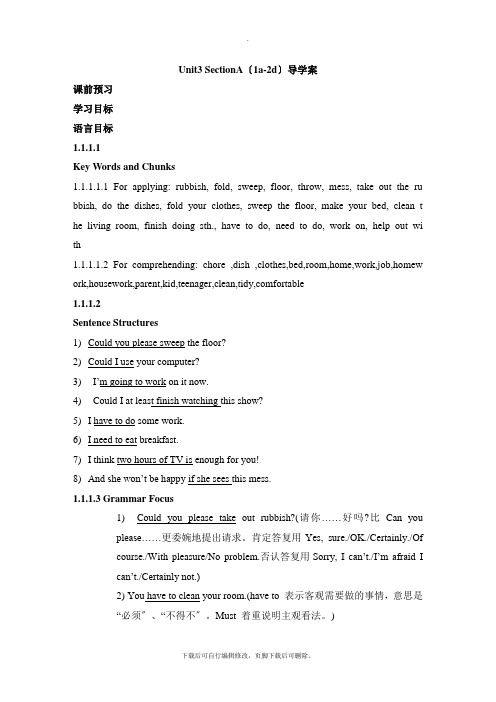
Unit3 SectionA〔1a-2d〕导学案课前预习学习目标语言目标1.1.1.1Key Words and Chunks1.1.1.1.1 For applying: rubbish, fold, sweep, floor, throw, mess, take out the ru bbish, do the dishes, fold your clothes, sweep the floor, make your bed, clean t he living room, finish doing sth., have to do, need to do, work on, help out wi th1.1.1.1.2 For comprehending: chore ,dish ,clothes,bed,room,home,work,job,homew ork,housework,parent,kid,teenager,clean,tidy,comfortable1.1.1.2Sentence Structures1)Could you please sweep the floor?2)Could I use your computer?3)I’m going to work on it now.4)Could I at least finish watching this show?5)I have to do some work.6)I need to eat breakfast.7)I think two hours of TV is enough for you!8)And she won’t be happy if she sees this mess.1.1.1.3 Grammar Focus1) Could you please take out rubbish?(请你……好吗?比Can youplease……更委婉地提出请求。
2020年春人教新目标英语八年级下册unit3 (Section B 2a-2e)导学案

2020年春人教新目标英语八年级下册Unit 3 Could you please clean your room?(Section B 2a-2e)Period 5【知识技能目标】✧掌握并灵活运用本课的重点词汇depend develop since neighbor ill drop (认读词汇independence fairness)✧重点短语in surprise, as soon as, come over, in front of, as…as, the minute✧读懂“做家务活动”话题的议论类文章,练习使用“略读策略”【情感态度目标】✧学会在生活中照顾自己,培养自己的独立意识【自主学习】1.使某人做某事2.enough stress3.浪费时间4.目的是;为了5.取得好成绩6.介意做某事7.依赖;依靠8.Independence发展孩子的独立性9.look after/take care of10.do one’ s part in (doing ) sth.做某人分内的事【合作探究】1.It is the parents’ job to provide a cleanand comfortable environment at home for their children. 给孩子们在家里提供一个干净而舒适的环境是父母的事情。
✧provide /prə'vaɪd/vt.& vi.提供,供应【观察】The store provides the children with free balloons. 商店给孩子供应免费的气球。
The school provided new uniforms for the band. 学校为乐队提供新的制服= The school provided the band with new uniforms.【小结】为某人提供某物provide something for somebody =___ _somebody something➢宾馆为客人提供擦鞋的服务。
【最新】人教版八年级英语下册Unit3(第1-2课时)导学案

最新教学资料·人教版英语Unit 3 .Could you please clean your room ?导学案(老师寄语:Never put off till tomorrow what you can do today .今日事今日毕)单元目标:1.学会使用教材词汇表中的黑体单词。
(重点)2. Sentences: Peter, could you please take out the trash?3. Grammar: 情态动词could 表示有礼貌的请求许可或提出要求的用法(难点)。
教学难点:情态动词could 表示有礼貌的请求许可或提出要求的用法。
情感目标:主动地帮助家人做杂务;学会照顾自己;培养自己的独立意识。
第1-2课时 (Section A 1a-2d)【内容标准】Make polite requests; Ask for permission【教学目标】1.掌握并灵活运用本课的重点词汇rubbish fold sweep floor mess2.重点短语sweep the floor, work on, finish doing, take out the rubbish3.听懂“请求做家务活动”的相关话题及文章;学会有礼貌地提出请求和请求准许【学习过程】一、创设情境,激情导入A: What chores does he do every day?B: He … every day. (ppt.配合展示)二、自主学习,自我提高自主学习本课内容完成下列练习1.My mother told me to_______(打扫) the floor every day.2.Don’t put your answer on the chair.______(折叠) it and put it on thebed.3.Jack,can you help me c_____ the living room?4.What a m______you made! You’d better clean it up before Mum gets home.5.Let’s t_____out the rubbish and put it in the trash bin.短语1.______________洗餐具2.____________ 倒垃圾3.fold the clothes________4.sweep the floor _____________5.make your/the bed ______________6.___________________打扫客厅7.______________没问题8.______________ 出去吃饭9.stay out late ______________10.go to the movies _____________11.get a ride ____________12.work on______13.______________做完某事14.______________ 干净又整洁语法探讨:1)Could you please + v.… ?以Could 引导的疑问句,表示有礼貌地提出。
2020年人教版八年级英语下册Unit3(第1-2课时)导学案
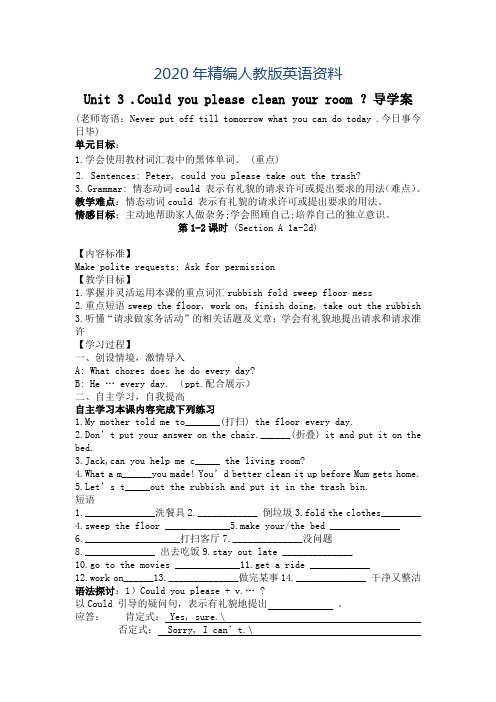
2020年精编人教版英语资料Unit 3 .Could you please clean your room ?导学案(老师寄语:Never put off till tomorrow what you can do today .今日事今日毕)单元目标:1.学会使用教材词汇表中的黑体单词。
(重点)2. Sentences: Peter, could you please take out the trash?3. Grammar: 情态动词could 表示有礼貌的请求许可或提出要求的用法(难点)。
教学难点:情态动词could 表示有礼貌的请求许可或提出要求的用法。
情感目标:主动地帮助家人做杂务;学会照顾自己;培养自己的独立意识。
第1-2课时 (Section A 1a-2d)【内容标准】Make polite requests; Ask for permission【教学目标】1.掌握并灵活运用本课的重点词汇rubbish fold sweep floor mess2.重点短语sweep the floor, work on, finish doing, take out the rubbish3.听懂“请求做家务活动”的相关话题及文章;学会有礼貌地提出请求和请求准许【学习过程】一、创设情境,激情导入A: What chores does he do every day?B: He … every day. (ppt.配合展示)二、自主学习,自我提高自主学习本课内容完成下列练习1.My mother told me to_______(打扫) the floor every day.2.Don’t put your answer on the chair.______(折叠) it and put it on thebed.3.Jack,can you help me c_____ the living room?4.What a m______you made! You’d better clean it up before Mum gets home.5.Let’s t_____out the rubbish and put it in the trash bin.短语1.______________洗餐具2.____________ 倒垃圾3.fold the clothes________4.sweep the floor _____________5.make your/the bed ______________6.___________________打扫客厅7.______________没问题8.______________ 出去吃饭9.stay out late ______________10.go to the movies _____________11.get a ride ____________12.work on______13.______________做完某事14.______________ 干净又整洁语法探讨:1)Could you please + v.… ?以Could 引导的疑问句,表示有礼貌地提出。
八年级英语导学案 (Unit3.I’m more outgoing than my sister Section A (1a-1c)

1、课外作业:练习册 2、书面作业:另附
活动 2. 大声朗读以上单词并根据 1a 要求 完成单词连线。 活动 3. 阅读课本 93 页至 94 页 1 至 2 中的 内容后,将下列单词变其为它们的比较级。 quiet__________; calm___________; smart____________; wild___________; 教 学 反 思
__________________
________________
________(heavy)
___________(outgoing)than her.(填空)
___________________ __________________ 1.88m
布置作 业
________________ ___________________
expensive___________; old____________; heavy________ ; hot _____________.
学习重点 识记形容词和副词比较级变法的多条规则
知识链接
表示外貌的易弄错的词:留长发 — have long hair; 属于中等身材— be of medium
教师寄语: It's never too old to learn. 活到 老,学到老。 一.课前准备:温故知新 写出下列词的反义词并大声朗读它们。 big__________; short__________; white_________; good____________; beautiful___________; easy___________; happy________; cool____________;
永兴九年制学校
八年级英语下册Unit3导学案(第2课时)

Unit 3 Could you please clean your room? 导学案Section A 2d—3a (阅读课)(第二课时知识目标: 1.掌握本课时的单词和短语。
2.学会礼貌地提出请求和请求允许做某事。
能力目标:通过小组合作探究与对话表演,提高合作共赢的能力和活学活用的能力。
情感目标:爱家庭,爱劳动,爱父母。
学习策略:完成阅读策略的“三步”,把握文章大意,获取信息,回答问题。
文化意识:了解西方国家孩子对家务劳动的态度。
重点:掌握并运用重点词汇和句子。
难点:对所学知识的灵活运用。
自主学习1.知识导航:(1). help out with a few things 帮忙做几件事(2). mess 常用可数名词单数:杂乱;不整洁eg. The room is in a terrible mess. 这个房间杂乱不堪。
(3). Could I at least finish watching this show? 至少等我看完这个节目可以吗?(4). Mom will be back from shopping any minute now. 妈妈随时都会买完东西回来。
(5). throw v. 扔;投掷(过去式:threw ) throw about 乱扔throw at 扔向(6). come over “过来”,动副词组,用作不及物动词,后面可接to sp.“过来到某地”(7). all the time “一直”,表示从某一特定阶段开始一直到结束,常用来修饰动词,多放在句末。
eg. If you are famous, people will watch you all the time. 教材学习:Step 1. Make a conversation in pairs about doing chores using make polite requests.Step 2. Read the conversation in 2d on P18 in pairs. Then discuss it with your partner.Step 3. Role-play the conversation.Step 4. 根据阅读策略,快速读课文并领会大意。
最新人教版八年级英语下册导学案(全册 共10个单元)
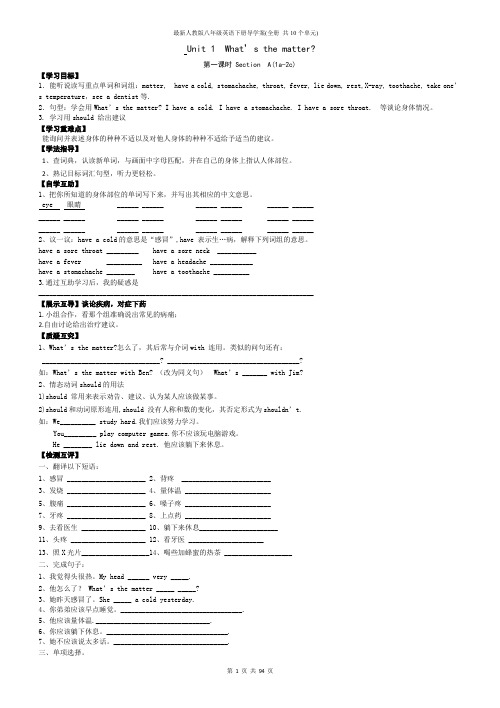
Unit 1 What’s the matter?第一课时 Section A(1a-2c)【学习目标】1.能听说读写重点单词和词组:matter, have a cold, stomachache, throat, fever, lie down, rest,X-ray, toothache, take one’s temperature,see a dentist等.2.句型:学会用What’s the matter? I have a cold. I have a stomachache. I have a sore throat. 等谈论身体情况。
3. 学习用should 给出建议【学习重难点】能询问并表述身体的种种不适以及对他人身体的种种不适给予适当的建议。
【学法指导】1、查词典,认读新单词,与画面中字母匹配,并在自己的身体上指认人体部位。
2、熟记目标词汇句型,听力更轻松。
【自学互助】1、把你所知道的身体部位的单词写下来,并写出其相应的中文意思。
eye 眼睛 ______ ______ ______ ______ ______ ____________ ______ ______ ______ ______ ______ ______ ____________ ______ ______ ______ ______ ______ ______ ______2、议一议:have a cold的意思是“感冒”,have 表示生…病,解释下列词组的意思。
have a sore throat _________ have a sore neck ___________have a fever __________ have a headache ____________have a stomachache ________ have a toothache __________3.通过互助学习后,我的疑惑是_____________________________________________________________________________【展示互导】谈论疾病,对症下药1.小组合作,看那个组准确说出常见的病痛;2.自由讨论给出治疗建议。
人教版八年级英语下册Unit3(第3课时)导学案(精修版)
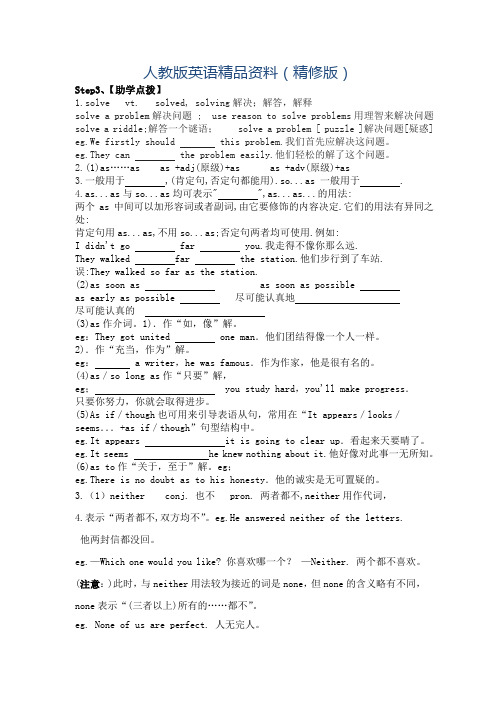
人教版英语精品资料(精修版)Step3、【助学点拨】1.solve vt. solved, solving解决;解答,解释solve a problem解决问题 ; use reason to solve problems用理智来解决问题solve a riddle;解答一个谜语; solve a problem [ puzzle ]解决问题[疑惑] eg.We firstly should this problem.我们首先应解决这问题。
eg.They can the problem easily.他们轻松的解了这个问题。
2.(1)as……as as +adj(原级)+as as +adv(原级)+as3.一般用于 ,(肯定句,否定句都能用).so...as 一般用于 .4.as...as与so...as均可表示" ",as...as...的用法:两个as中间可以加形容词或者副词,由它要修饰的内容决定.它们的用法有异同之处:肯定句用as...as,不用so...as;否定句两者均可使用.例如:I didn't go far you.我走得不像你那么远.They walked far the station.他们步行到了车站.误:They walked so far as the station.(2)as soon as as soon as possibleas early as possible 尽可能认真地尽可能认真的(3)as作介词。
1).作“如,像”解。
eg:They got united one man.他们团结得像一个人一样。
2).作“充当,作为”解。
eg: a writer,he was famous.作为作家,他是很有名的。
(4)as/so long as作“只要”解,eg; you study hard,you'll make progress.只要你努力,你就会取得进步。
八年级英语下册第三单元导学案(全单元)

Unit 3 Could you please clean your room?第一课时(Section A 1a-1c)【学习目标】1.学习有礼貌地表达请求和征求意见的交际用语,能正确使用could 来表示请求。
2.通过谈论家务琐事和家庭互助的话题,培养学生热爱劳动的品质。
【学习重点】★重点单词:rubbish(垃圾;废弃物), fold(折叠;对折), sweep(扫;打扫), floor(地板).★重点短语:take out the rubbish(倒垃圾).★重点句型:— Could you please sweep the floor?(你能扫地吗?)— Y es, sure. Can you do the dishes?(是的,当然可以。
你可以洗盘子吗?)— Well, could you please do them? I’m going to clean the living room.(哦,你能洗它们吗?我要去打扫起居室。
)— No problem.(没问题。
)【课前预习方案】(一)小小翻译官。
(请预习课文,将下列中文译成英文)1.家务活chores/housework2.洗餐具do the dishes3.扫地sweep the floor4.倒垃圾take out the rubbish5.整理床铺make the bed6.叠衣服fold the clothes7.打扫起居室clean the living room 8.没问题no problem(二)请试着用英语写出下列家务活动的名称。
并在你平常做的家务活动后打“√”,在你不做的家务活动后面打“Χ”。
()()()do the dishes take out the rubbish fold the clothes()()()sweep the floor make the bed clean the living room(三)想一想。
人教版八年级英语下册导学案(知识点+练习题带答案)

初二英语下册导学案(知识汇总+练习题)Unit 1单词matter [ˈmætə] v. 重要,要紧,有关系What’s the matter? 怎么了?出什么事了?sore [sɔ:(r)] adj. 疼痛的,酸痛的have a cold 感冒stomach ['stʌmək] n. 胃,腹部stomachache ['stʌməkeɪk] n. 胃痛,腹痛have a stomachache 胃痛foot(复数feet) [fu:t] n. 脚neck [nek] n. 颈,脖子throat [θrəʊt] n. 喉咙fever ['fi:və] n. 发烧,发热lie [laɪ] v. 躺,平躺lie down 躺下rest [rest] n. 剩余部分,其余;放松,休息cough [kɒf] n. & v. 咳嗽X-ray ['eksreɪ] n. X光,X射线toothache [ˈtu:θeɪk] n. 牙痛take one's temperature 量体温headache [ˈhedeɪk] n. 头痛have a fever 发烧break [breɪk] n. & v. 休息,暂停;打破take breaks (take a break)休息hurt [hə:t] v. 伤害,损害,使受伤,疼passenger ['pæsɪndʒə] n. 乘客,旅客off [ɒf] adv. prep. 离开(某处);从…去掉get off 下车to one's surprise 使…惊讶,出乎…意料onto [ˈɒntə] prep. 向,朝trouble [ˈtrʌbl] n. 麻烦,烦扰,问题hit [hit] n. & v. 碰撞,打,打击right away 立即,马上get into 陷入,参与herself [hə:ˈself]她自己,她本身(she的反身代词)bandage ['bændɪdʒ] n. & v. 绷带;用绷带包扎sick [sɪk] adj. 患病的,不适的knee [ni:] n. 膝盖nosebleed [ˈnəʊzbli:d] n. 鼻出血breathe [bri:ð] v. 呼吸sunburned [ˈsʌnbɜ:nd] adj. 晒伤的ourselves [ɑ:ˈselvz]我们自己(we的反身代词)climber [ˈklaɪmə(r)] n. 登山者be used to 习惯于… 适应于…risk [rɪsk] n. & v. 风险,危险;冒险take risks (take a risk) 冒险accident [ˈæksidənt] n. 意外事件;事故situation [ˌsitjuˈeiʃən] n. 状况,形式,情况kg=kilogram [ˈkɪləgræm] n. 公斤,千克rock [rɔk] n. 岩石run out (of) 用尽,耗尽knife [naif] n. 刀,餐刀cut off 切除blood [blʌd] n. 血mean [mi:n] v. 意味着,意思是,意欲get out of 离开,从… 出来importance [ɪmˈpɔ:tns] n. 重要性decision [dɪ'sɪʒn] n. 决心,决定,抉择control [kən'trəʊl] v. 控制,支配,操纵be in control of 掌管,管理spirit ['spɪrɪt] n. 勇气,意志death [deθ] n. 死亡give up 放弃nurse [nə:s] n. 护士Unit1 知识梳理【重点单词】matter [ˈmætə] v. 重要,要紧,有关系What’s the matter? 怎么了?出什么事了?sore [sɔ:(r)] adj. 疼痛的,酸痛的have a cold 感冒stomach ['stʌmək] n. 胃,腹部stomachache ['stʌməkeɪk] n. 胃痛,腹痛have a stomachache 胃痛foot(复数feet) [fu:t] n. 脚neck [nek] n. 颈,脖子throat [θrəʊt] n. 喉咙fever ['fi:və] n. 发烧,发热lie [laɪ] v. 躺,平躺lie down 躺下rest [rest] n. 剩余部分,其余;放松,休息cough [kɒf] n. & v. 咳嗽X-ray ['eksreɪ] n. X光,X射线toothache [ˈtu:θeɪk] n. 牙痛take one's temperature 量体温headache [ˈhedeɪk] n. 头痛have a fever 发烧break [breɪk] n. & v. 休息,暂停;打破take breaks (take a break)休息hurt [hə:t] v. 伤害,损害,使受伤passenger ['pæsɪndʒə] n. 乘客,旅客off [ɒf] adv. prep. 离开(某处);从…去掉get off 下车to one's surprise 使…惊讶,出乎…意料onto [ˈɒntə] prep. 向,朝trouble [ˈtrʌbl] n. 麻烦,烦扰,问题hit [hit] n. & v. 碰撞,打,打击right away 立即,马上get into 陷入,参与herself [hə:ˈself] pron. 她自己,她本身(she 的反身代词)bandage ['bændɪdʒ] n. & v. 绷带;用绷带包扎sick [sɪk] adj. 患病的,不适的knee [ni:] n. 膝盖nosebleed [ˈnəʊzbli:d] n. 鼻出血breathe [bri:ð] v. 呼吸sunburned [ˈsʌnbɜ:nd] adj. 晒伤的ourselves [ɑ:ˈselvz] pron. 我们自己(we的反身代词)climber [ˈklaɪmə(r)] n. 登山者be used to 习惯于… 适应于…risk [rɪsk] n. & v. 风险,危险;冒险take risks (take a risk) 冒险accident [ˈæksidənt] n. 意外事件;事故situation [ˌsitjuˈeiʃən] n. 状况,形式,情况kg=kilogram [ˈkɪləgræm] n. 公斤,千克rock [rɔk] n. 岩石run out (of) 用尽,耗尽knife [naif] n. 刀,餐刀cut off 切除blood [blʌd] n. 血mean [mi:n] v. 意味着,意思是,意欲get out of 离开,从… 出来importance [ɪmˈpɔ:tns] n. 重要性decision [dɪ'sɪʒn] n. 决心,决定,抉择control [kən'trəʊl] v. 控制,支配,操纵be in control of 掌管,管理spirit ['spɪrɪt] n. 勇气,意志death [deθ] n. 死亡give up 放弃nurse [nə:s] n. 护士【重点短语】1.have a fever 发烧2.have a cough 咳嗽3.have a toothache 牙疼4.talk too much 说得太多5.drink enough water 喝足够的水6.have a cold 受凉;感冒7.have a stomachache 胃疼8.have a sore back 背疼9.have a sore throat 喉咙痛10. take risks 冒险11.hot tea with honey 加蜂蜜的热茶12.see a dentist 看牙医13.get an X-ray 拍X 光片14.take one’ s temperature 量体温15.put some medicine on sth. 在……上面敷药16. give up 放弃17. sound like 听起来像18. all weekend 整个周末19. in the same way 以同样的方式20. go to a doctor 看医生21. go along 沿着……走22. on the side of the road 在马路边23. shout for help 大声呼救24. without thinking twice 没有多想25. get off 下车26. have a heart problem 有心脏病27. to one’ s surprise 另某人惊讶的是28. thanks to 多亏了;由于29. in time 及时30. make a decision 做出决定31. get into trouble 造成麻烦32. right away 立刻;马上33. because of 由于34. get out of 离开;从……出来35. keep on doing sth. 继续或坚持做某事36. put a bandage on sth. 用绷带包扎37. fall down 摔倒38. feel sick 感到恶心39. have a nosebleed 流鼻血40. cut his knee 割伤他的膝盖41. put her head back 把她的头向后仰42. have problems breathing 呼吸困难43. mountain climbing 登山运动44. be used to doing sth. 习惯做某事45. run out (of) 用完;用尽46. so that 以便47. so...that... 如此……以至于...…48. be in control of 掌管;管理49. in a difficult situation 在闲境中【重点句型】1. What's the matter with you?= What'the trouble with you?= What's wrong with you? 你怎么了?2. What should she do? 她该怎么办呢?3.Should I take my temperature? 我应该量一下体温吗?4.You should lie down and rest. 你应该躺下休息一会儿。
- 1、下载文档前请自行甄别文档内容的完整性,平台不提供额外的编辑、内容补充、找答案等附加服务。
- 2、"仅部分预览"的文档,不可在线预览部分如存在完整性等问题,可反馈申请退款(可完整预览的文档不适用该条件!)。
- 3、如文档侵犯您的权益,请联系客服反馈,我们会尽快为您处理(人工客服工作时间:9:00-18:30)。
【反馈检测】
一.根据汉语提示完成英语句子。
1.She is(叠衣服) now.
2.I don’t hate(倒垃圾). It’s fun.
3.Miss Kang often(打扫起居室)at weekends.
4.Mr. Wang likes to helps his wife(洗衣服).
导学策略及学法指导(师生互动设计)
反
馈
检
测
教
后
反
思
5.Lucy’s mother asks her(整理床铺)by herself after she gets up in the morning.
二.用所给单词的适当形式填空。
st week everyone was trying(cheer) up Jimmy.
2.He now has 16 bikes(fix) up.
2c Make conversations using the information in 2a and 2b
A: Could I use your computer?
B: Sorry. I’m going to work on it now.
A: Well, could I watch TV?
B: Yes, you can. But first you have to clean your room?
别担心,他会马上来这儿。
The guests are arriving any time now but we’re still not ready.
客人即刻就到,但我们还没有准备好。
We’re expecting them any moment now.
合
作
探
究
导
学
过
程
四
步
设
计交流展来自示【交流展示】
3.I want(travel) alone. My parents told me(not do) so.
4.At 12:00 a.m. ,I called my friend(come) over for lunch.
5.I saw him(play) basketball almost every day.
导学策略及学法指导(师生互动设计)
导
学
过
程
四
步
设
计
自
主
学
习
【自主学习】
1.听写上节课所学的短语。
do the dishes, sweep the floor, take out the trash, make the bed, fold the clothes, clean the room
2.展开对话—Could you please…?
我11点以前回不来。
4.any minute now
一种常见的口语表达法,相当于“随时;马上;在任何时刻”的意思,表示事情有可能在极短的时间内发生或眼下就要发生。
minute还可以用second, moment, time等词替换。
e.g. Don't worry, he will come here any minute now.
—Yes, please. / Sorry, I can’t.
3.作出听力预测。
4.找出有礼貌地提出要求的句子;圈出并努力弄懂重点难点句子。
【合作探究】
Language points:
1.help out动词短语,表示在某人繁忙或遇到困难时“给予帮助”。help和out之间还可以加入具体的“人”。
e.g. He helped me out with my task.
庙渠初中“三环四步”导学案
年级
八
科目
英
课题
Unit3第二课时
主备人
周次
教学辅助手段
导学
目标
1.谈论做家务的词汇,及如何有礼貌的提出要求。
2.能听懂和谈论做家务的话题;能写出重点单词和重点句型
重点
难点
Role-play the conversation.
导学
模式
自学--------展示-------反馈
他帮我完成了任务。
They helped (us) out with the clean-up.
他们帮助我们做大扫除。
2.at least至少
e.g. We should brush our teeth at least twice a day.
我们每天应该至少刷两次牙。
3.be back回来
e.g. I won't be back till 11:00.
